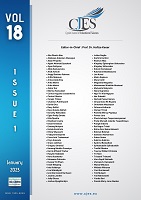Problem solving in science technology and society learning improving junior high school students' scientific attitudes and process skills
Problem solving in science technology and society learning improving junior high school students' scientific attitudes and process skills
Author(s): Pamella Mercy Papilaya, Meganita Meganita, Prelly Marsell Jolanda TuapattinayaSubject(s): School education, Educational Psychology, Social psychology and group interaction, Cognitive Psychology, Organizational Psychology, Behaviorism, Methodology and research technology, Sociology of Education
Published by: Birlesik Dunya Yenilik Arastirma ve Yayincilik Merkezi
Keywords: problem solving; technology and society; cognitive learning outcome;
Summary/Abstract: Problem solving research applied in the Science Technology and Society Learning aimed to improve students' science process skills and scientific attitudes. For this purpose, two complete classes of the same teacher were randomly assigned to the experimental and control groups. The research was conducted at a public school in Ambon City, beginning with a classroom placement test. The cognitive learning outcome test instrument was developed with a cognitive load that has been achieved according to the unit level, namely class IX and has met the prerequisite test of the instrument's quality. This research aimed to develop the instrument self assessment and peer assessment to assess the scientific attitude and the skill of process in studying science with scientific approach which is reliable, valid, useful, and easy to be used.The results showed that there was a statistically significant difference between the two groups related to process skills and attitudes towards science after the treatment. In the experimental group, mean scores were found to be consistently higher across all dimensions of process skills and scientific attitudes compared to the control group. Besides, the mean score showed an increase in the experimental group students'. The qualitative findings also reveal that students find problem solving fun. According to problem solving students, finding information and writing reports is one of the problem solving features that contributes the most to their learning.
Journal: Kıbrıslı Eğitim Bilimleri Dergisi
- Issue Year: 18/2023
- Issue No: 1
- Page Range: 16-30
- Page Count: 15
- Language: English

